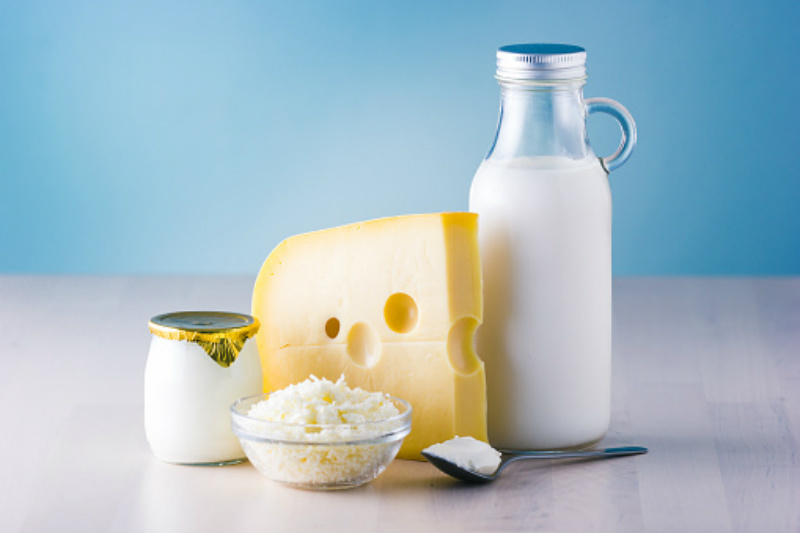More wishy-washy shit. Answer the damn question with a specific diet protocol for specific needs. Once again you are on your own to do research to figure out what you need. Hope you have saved up enough money to hire researchers or put your kids thru university to answer these questions.
Or you can guess from these posts;
- dairy (5)
- dairy fat (7)
- dairy products (4)
Is dairy bad for you?
Naveed Saleh, MD, MS, for MDLinx | January 29, 2019
There have been mixed reviews when it comes
to the health benefits of dairy; however, a new study presented at the
Annual Congress of the European Society of Cardiology (ESC) may put
rumors to rest.
In the past, researchers of a meta-analysis of 29 cohort studies found no significant link between consuming dairy and cardiovascular disease and all-cause mortality. But in another large, prospective, 20-year study in Swedish adults, investigators found that higher milk consumption was associated with a doubled risk of mortality in women.
But dairy products may actually protect against all-cause mortality and mortality secondary to cerebrovascular disease in adults.
An analysis of results from the Nutrition Examination Surveys (NHANES) study, led by Maciej Banach, MD, PhD, Department of Hypertension at Medical University of Lodz, Poland, and performed by the CDC between 1999 and 2010 demonstrated that in 24,474 adult participants (mean age: 47.6 years; 51.4% women), during a follow-up of 76.4 months, there were 3,520 deaths, including 827 secondary to cancer, 709 secondary to heart disease, and 228 due to cerebrovascular disease.
On closer inspection of the CDC study, the team discovered that the consumption of all dairy was correlated with a 2% decreased total mortality risk, with cheese consumption reducing the risk by 8%. With respect to cerebrovascular mortality, they observed a 4% drop in risk due to all-dairy consumption and a 7% drop due to milk consumption.
Results from the most recent meta-analysis, which was presented at the ESC and also led by Dr. Banach, included 12 prospective cohort studies conducted in 636,726 participants followed for about 15 years. The results supported those from the CDC study. Drinking milk, however, was associated with a 4% increase in mortality risk. On a related note, the consumption of yogurt and other fermented dairy products yielded a 3% decrease in total mortality, although this finding was not significant.
“In light of the protective effects of dairy products,” said Dr. Banach, “public health officials should revise the guidelines on dairy consumption. And given the evidence that milk increases the risk of CHD, it is advisable to drink fat-free or low-fat milk.”
Ultimately, the researchers stressed that restrictions on dairy intake be loosened by public health agencies. Furthermore, switching to fat-free or low-fat milk is particularly important in adults who drink higher amounts of milk.
In the past, researchers of a meta-analysis of 29 cohort studies found no significant link between consuming dairy and cardiovascular disease and all-cause mortality. But in another large, prospective, 20-year study in Swedish adults, investigators found that higher milk consumption was associated with a doubled risk of mortality in women.
But dairy products may actually protect against all-cause mortality and mortality secondary to cerebrovascular disease in adults.
An analysis of results from the Nutrition Examination Surveys (NHANES) study, led by Maciej Banach, MD, PhD, Department of Hypertension at Medical University of Lodz, Poland, and performed by the CDC between 1999 and 2010 demonstrated that in 24,474 adult participants (mean age: 47.6 years; 51.4% women), during a follow-up of 76.4 months, there were 3,520 deaths, including 827 secondary to cancer, 709 secondary to heart disease, and 228 due to cerebrovascular disease.
On closer inspection of the CDC study, the team discovered that the consumption of all dairy was correlated with a 2% decreased total mortality risk, with cheese consumption reducing the risk by 8%. With respect to cerebrovascular mortality, they observed a 4% drop in risk due to all-dairy consumption and a 7% drop due to milk consumption.
Results from the most recent meta-analysis, which was presented at the ESC and also led by Dr. Banach, included 12 prospective cohort studies conducted in 636,726 participants followed for about 15 years. The results supported those from the CDC study. Drinking milk, however, was associated with a 4% increase in mortality risk. On a related note, the consumption of yogurt and other fermented dairy products yielded a 3% decrease in total mortality, although this finding was not significant.
“In light of the protective effects of dairy products,” said Dr. Banach, “public health officials should revise the guidelines on dairy consumption. And given the evidence that milk increases the risk of CHD, it is advisable to drink fat-free or low-fat milk.”
Ultimately, the researchers stressed that restrictions on dairy intake be loosened by public health agencies. Furthermore, switching to fat-free or low-fat milk is particularly important in adults who drink higher amounts of milk.
 Although dairy has gotten a bad rap, researchers of two recent studies have shown that it actually decreases risk of mortality.
Although dairy has gotten a bad rap, researchers of two recent studies have shown that it actually decreases risk of mortality.
No comments:
Post a Comment